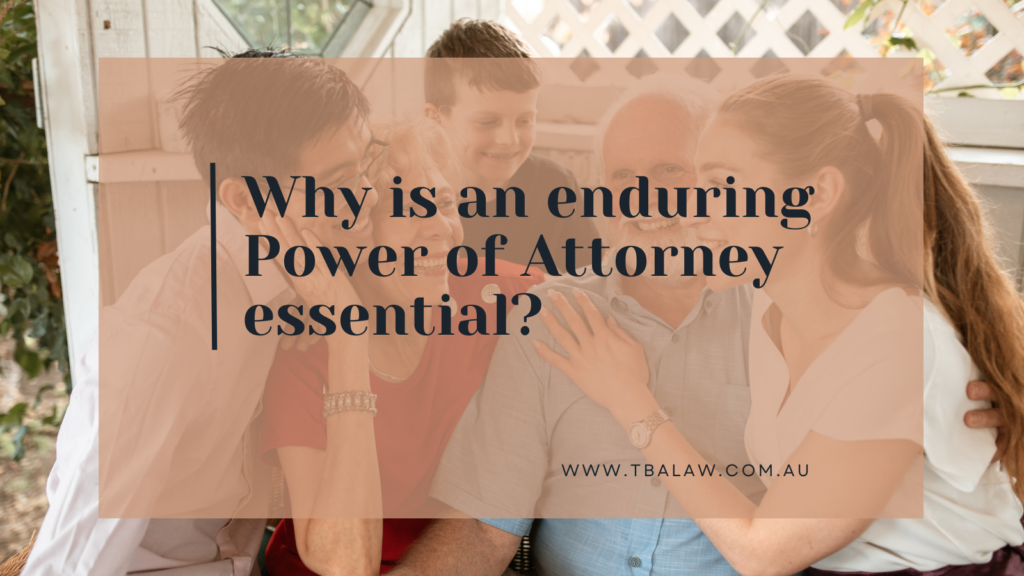Why is an enduring Power of Attorney essential?
by Jacqui Brauman
Today I’m going to talk about enduring powers of attorney, an important part of your estate planning. Younger people often wonder, “Why have an enduring power of attorney?” while those who are a little older often take it for granted that they need one. However, I think you should have one regardless of your age.

Most people know that a will takes effect only after the person who made it dies.
What happens in between? An enduring power of attorney is an advance directive that remains valid after a person loses capacity and enables another person to make decisions on behalf of the disabled individual. It’s called “enduring” because it lasts past when you can no longer make decisions for yourself; a general power of attorney only applies while you have mental capacity, but gives another person the power to do something on your behalf if you can’t do it for yourself (like if you were going overseas or some other sort of condition arose), and gives a specific task to a specific person to do.
An enduring power of attorney is broader than a regular power of attorney.
It gives you more authority to make decisions for yourself, but it can also be narrowed down so that certain conditions must be met before certain actions are taken. For example, you could require that your lawyer only act on your behalf if you are unable to make decisions for yourself. Why do I suggest that younger people do an enduring power of attorney when they do their estate planning? Well, because an emergency might strike and leave you incapacitated for a time. If something like this happens and you have an enduring power of attorney in place, someone will be able to step in and make decisions for you while you’re recovering or unable to make decisions for yourself.
If you don’t have an enduring power of attorney and an emergency happens, people will run off to VCAT to get an administration order.
You don’t have a say over who gets that order or what the conditions are. If you do your enduring power of attorney, particularly if you’ve still got children who are under 18, then the people you put in as your powers of attorney also step in as parents. Particularly for single parents, if you don’t want the other parent to have complete control over your dependents (if something happens to you), then you need to say who is the person with some parental responsibility to help out with those dependents if you’re unable to.
An enduring power of attorney is important if you are going to be hospitalized for a couple of weeks and you cannot communicate with anyone. Someone needs to know the routine well enough to keep things going, someone needs to know how to keep your household running in terms of where bills are coming in, where you bank, and how to make sure things still get paid so your insurance stays in place, things don’t get cut off, or even if they can step in and live in your house with your children so that the children are not as disrupted. These are all reasons why an enduring power of attorney can be really important–it’s an “in case of emergency” sort of situation.
If you don’t have an enduring power of attorney in place then it’s too late to try and put something in place once something has happened. The good news is that no harm comes from getting it done when you get your will done and doing all your documents at once.
The other way to do it is to have the power start immediately and then have a condition in it saying that the people you appoint can’t do anything on your behalf without your specific direction, if you’re still capable.
This is helpful if someone is older, still capable but slowing down with their own affairs. They can have someone appointed who can do things but only on their direction. You also need to think about who you appoint as your power of attorney so it’s quite strict as to the rules around who you appoint in terms of what they can and can’t do. They cannot mix their own funds with yours. The person you choose to act as your attorney-in-fact cannot act in conflict with your interest, must not give gifts to themselves, and must not charge a fee for doing so. If you appoint multiple people as your attorney-in-fact and they keep an eye on each other, this helps prevent elder abuse. Lawmakers have strengthened these rules in recent years after conducting research into the circumstances surrounding cases of elder abuse. Laws have changed. It’s now a criminal offense if someone appointed under power of attorney does something wrong, not just fraud. So it’s now specified as a criminal offense if someone appointed under power of attorney does something wrong and money can be recovered from that person.
If you want peace of mind and trusted advisers looking after your affairs if something bad happens, a good power of attorney is well worth considering. Our team at TBA Law can help you draft one that works for you—and then make sure it’s filed with the right people. Send an email to admin@tbalaw.com.au or call 1300 043 103.






Leave A Comment